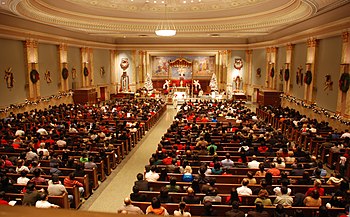Kehadiran gereja

Kehadiran gereja adalah sebuah praktek keagamaan utama bagi kebanyakan umat Kristen. Beberapa denominasi Kristen, seperti Gereja Katolik, mewajibkan kehadiran gereja pada Hari Tuhan (Minggu). Pengakuan Iman Westminster diadakan oleh Gereja-gereja Reformasi dan mengajarkan Sabatarianisme hari pertama,[2] sehingga memenuhi kewajiban ibadah publik sesuai dengan Sepuluh Perintah Allah.[3]
Catatan[sunting | sunting sumber]
Referensi[sunting | sunting sumber]
- ^ Jespersen, Knud J. V. (21 June 2011). A History of Denmark (dalam bahasa Inggris). Macmillan International Higher Education. hlm. 91. ISBN 9780230344174.
It is quite normal to go to church on Christmas Eve, and many people like to celebrate a christening or wedding in church. The Church is especially important at the end of a life; by far the majority of funerals are still conducted in a church by a minister.
- ^ Wigley, John (1980). The Rise and Fall of the Victorian Sunday
 (dalam bahasa Inggris). Manchester University Press. hlm. 800. ISBN 9780719007941.
(dalam bahasa Inggris). Manchester University Press. hlm. 800. ISBN 9780719007941. Following the formulation of the Westminster Confession, fully fledged Sabbatarianism quickly took root too, being embodied in an Act of 1661, then spreading northwards and westwards as the Highlands were opened up after the '46, during which time the doctrine lost its original force and vigour in the Lowlands.
- ^ McKim, Donald K. (2011). More Presbyterian Questions, More Presbyterian Answers: Exploring Christian Faith. Westminster John Knox Press. hlm. 72. ISBN 9780664503086.
The Westminster Confession urges a strict observance of the Lord's Day as a day of rest and worship, away from "works, words, and thoughts" about "worldly employments and recreations." The whole time is to be devoted to "public and private exercises of [God's) worship, and in duties of necessity and mercy" (BC 6.119). In the United States, many "blue laws" relating to Sunday originated from this general prescription observed by American Puritans of the Reformed tradition.
